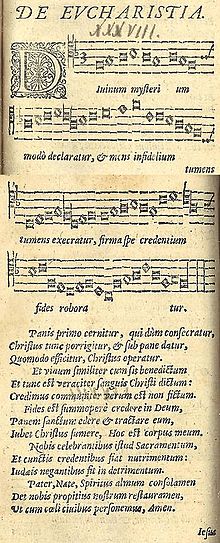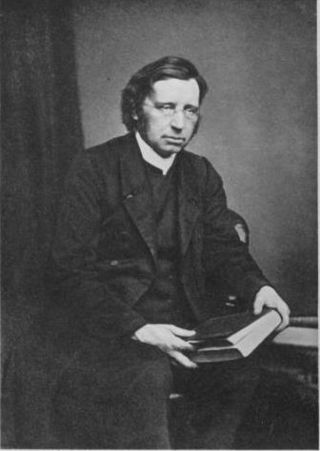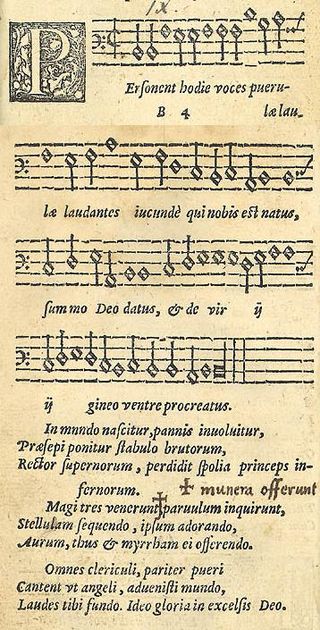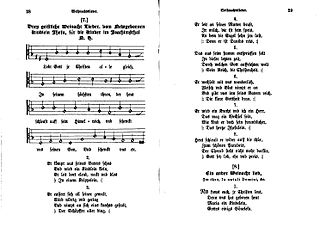Latin text by Prudentius
(born 348) [7] | Translation by Roby Furley Davis
for The English Hymnal (1906) [8] | Translation by J. M. Neale, extended
by Henry W. Baker (1851/1861) [9] |
|---|
Corde natus ex parentis
Ante mundi exordium
A et O cognominatus,
ipse fons et clausula
Omnium quæ sunt, fuerunt,
quæque post futura sunt.
Sæculorum sæculis. | Of the Father's heart begotten,
Ere the world from chaos rose,
He is Alpha, from that Fountain
All that is and hath been flows;
He is Omega, of all things,
Yet to come the mystic Close,
Evermore and evermore. | Of the Father's love begotten,
Ere the worlds began to be,
He is Alpha and Omega,
He the source, the ending He,
Of the things that are, that have been,
And that future years shall see,
Evermore and evermore! |
Ipse iussit et creata,
dixit ipse et facta sunt,
Terra, cælum, fossa ponti,
trina rerum machina,
Quæque in his vigent sub alto
solis et lunæ globo.
Sæculorum sæculis. | By His Word was all created
He commanded and 'twas done;
Earth and sky and boundless ocean,
Universe of three in one,
All that sees the moon's soft radiance,
All that breathes beneath the sun,
Evermore and evermore. | At His Word the worlds were framèd;
He commanded; it was done:
Heaven and earth and depths of ocean
In their threefold order one;
All that grows beneath the shining
Of the moon and burning sun,
Evermore and evermore! |
Corporis formam caduci,
membra morti obnoxia
Induit, ne gens periret
primoplasti ex germine,
Merserat quem lex profundo
noxialis tartaro.
Sæculorum sæculis. | He assumed this mortal body,
Frail and feeble, doomed to die,
That the race from dust created,
Might not perish utterly,
Which the dreadful Law had sentenced
In the depths of hell to lie,
Evermore and evermore. | He is found in human fashion,
Death and sorrow here to know,
That the race of Adam's children
Doomed by law to endless woe,
May not henceforth die and perish
In the dreadful gulf below,
Evermore and evermore! |
O beatus ortus ille,
virgo cum puerpera
Edidit nostram salutem,
feta Sancto Spiritu,
Et puer redemptor orbis
os sacratum protulit.
Sæculorum sæculis. | O how blest that wondrous birthday,
When the Maid the curse retrieved,
Brought to birth mankind's salvation
By the Holy Ghost conceived,
And the Babe, the world's Redeemer
In her loving arms received,
Evermore and evermore. | O that birth forever blessèd,
When the virgin, full of grace,
By the Holy Ghost conceiving,
Bore the Saviour of our race;
And the Babe, the world's Redeemer,
First revealed His sacred face,
evermore and evermore! |
Psallat altitudo caeli,
psallite omnes angeli,
Quidquid est virtutis usquam
psallat in laudem Dei,
Nulla linguarum silescat,
vox et omnis consonet.
Sæculorum sæculis. | Sing, ye heights of heaven, his praises;
Angels and Archangels, sing!
Wheresoe’er ye be, ye faithful,
Let your joyous anthems ring,
Every tongue his name confessing,
Countless voices answering,
Evermore and evermore. | O ye heights of heaven adore Him;
Angel hosts, His praises sing;
Powers, dominions, bow before Him,
and extol our God and King!
Let no tongue on earth be silent,
Every voice in concert sing,
Evermore and evermore! |
Ecce, quem vates vetustis
concinebant sæculis,
Quem prophetarum fideles
paginæ spoponderant,
Emicat promissus olim;
cuncta conlaudent eum.
Sæculorum sæculis. | This is He, whom seer and sibyl
Sang in ages long gone by,;
This is He of old revealed
In the page of prophecy;
Lo! He comes the promised Saviour;
Let the world his praises cry!
Evermore and evermore. | This is He Whom seers in old time
Chanted of with one accord;
Whom the voices of the prophets
Promised in their faithful word;
Now He shines, the long expected,
Let creation praise its Lord,
Evermore and evermore! |
Macte iudex mortuorum,
macte rex viventium,
Dexter in Parentis arce
qui cluis virtutibus,
Omnium venturus inde
iustus ultor criminum.
Sæculorum sæculis. | Hail! Thou Judge of souls departed;
Hail! of all the living King!
On the Father's right hand throned,
Through his courts thy praises ring,
Till at last for all offences
Righteous judgement thou shalt bring,
Evermore and evermore. | Righteous Judge of souls departed,
Righteous King of them that live,
On the Father's throne exalted
None in might with Thee may strive;
Who at last in vengeance coming
Sinners from Thy face shalt drive,
Evermore and evermore! |
Te senes et te iuventus,
parvulorum te chorus,
Turba matrum, virginumque,
simplices puellulæ,
Voce concordes pudicis
perstrepant concentibus.
Sæculorum sæculis. | Now let old and young uniting
Chant to thee harmonious lays
Maid and matron hymn Thy glory,
Infant lips their anthem raise,
Boys and girls together singing
With pure heart their song of praise,
Evermore and evermore. | Thee let old men, Thee let young men,
Thee let boys in chorus sing;
Matrons, virgins, little maidens,
With glad voices answering:
Let their guileless songs re-echo,
And the heart its music bring,
Evermore and evermore! |
Tibi, Christe, sit cum Patre
hagioque Pneumate
Hymnus, decus, laus perennis,
gratiarum actio,
Honor, virtus, victoria,
regnum aeternaliter.
Sæculorum sæculis. | | Christ, to Thee with God the Father,
And, O Holy Ghost, to Thee,
Hymn and chant with high thanksgiving,
And unwearied praises be:
Honour, glory, and dominion,
And eternal victory,
Evermore and evermore! |
Fluminum lapsus et undae
littorum crepidines,
Imber, aestus, nix, pruina,
silva, et aura, nox, dies,
Omnibus te concelebrent
sæculorum sæculis,
Sæculorum sæculis. | Let the storm and summer sunshine,
Gliding stream and sounding shore,
Sea and forest, frost and zephyr,
Day and night their Lord adore;
Let creation join to laud thee
Through the ages evermore,
Evermore and evermore. | |



















